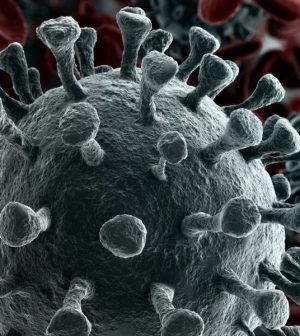- Recognizing the Signs of Hypothyroidism
- 10 Strategies to Overcome Insomnia
- Could Artificial Sweeteners Be Aging the Brain Faster?
- Techniques for Soothing Your Nervous System
- Does the Water in Your House Smell Funny? Here’s Why
- Can a Daily Dose of Apple Cider Vinegar Actually Aid Weight Loss?
- 6 Health Beverages That Can Actually Spike Your Blood Sugar
- Treatment Options for Social Anxiety Disorder
- Understanding the Connection Between Anxiety and Depression
- How Daily Prunes Can Influence Cholesterol and Inflammation
Young, Immune-Compromised Patients Are Hotspots for Coronavirus Mutations: Study

COVID-19 infections may last longer in young people with weakened immune systems, and that extended period could lead to more mutations in SARS-CoV-2, according to the authors of a new case study.
The study included two children and a young adult who had weakened immune systems due to treatment for acute lymphoblastic leukemia. For months, they tested positive for SARS-CoV-2, the virus that causes COVID-19.
Most people are infectious for only about 10 days after first showing COVID-19 symptoms, the Children’s Hospital Los Angeles researchers noted.
The investigators said their study — published online April 26 in the journal EBioMedicine — is the first report of prolonged SARS-CoV-2 infection in kids or young adults.
“It’s significant that these patients continued to have active symptoms and active infections for such a long time,” said study co-author Jennifer Dien Bard, director of the hospital’s Clinical Microbiology and Virology Laboratory.
“The large number of pediatric and adult patients receiving cancer therapy and being actively screened for the virus leads us to conclude that this is a rare occurrence but one that could have public health implications,” she said in a hospital news release.
SARS-CoV-2 mutates about once or twice a month, so a long period of infection raises concerns about more viral mutations, Dien Bard explained.
Most mutations don’t affect how the virus behaves or the disease it causes, but some may change how the virus acts. For example, the B.1.1.7 variant has 17 mutations and is believed to be more infectious than other virus variants.
Dien Bard said some evidence suggests the B.1.1.7 variant may have originated in a person who was immunocompromised and consistently infected with SARS-CoV-2.
But months-long infections are rare even in patients whose immune systems are compromised, the researchers noted.
“We have had many other immunocompromised patients who have not experienced these prolonged infections, but it’s something to be aware of, and hospitals may want to consider changing infection control policies to address this particular special population,” Dien Bard said.
More information
The U.S. Centers for Disease Control and Prevention has more on COVID-19 and people with certain medical conditions.
SOURCE: Children’s Hospital Los Angeles, news release, April 28, 2021
Source: HealthDay
Copyright © 2026 HealthDay. All rights reserved.










